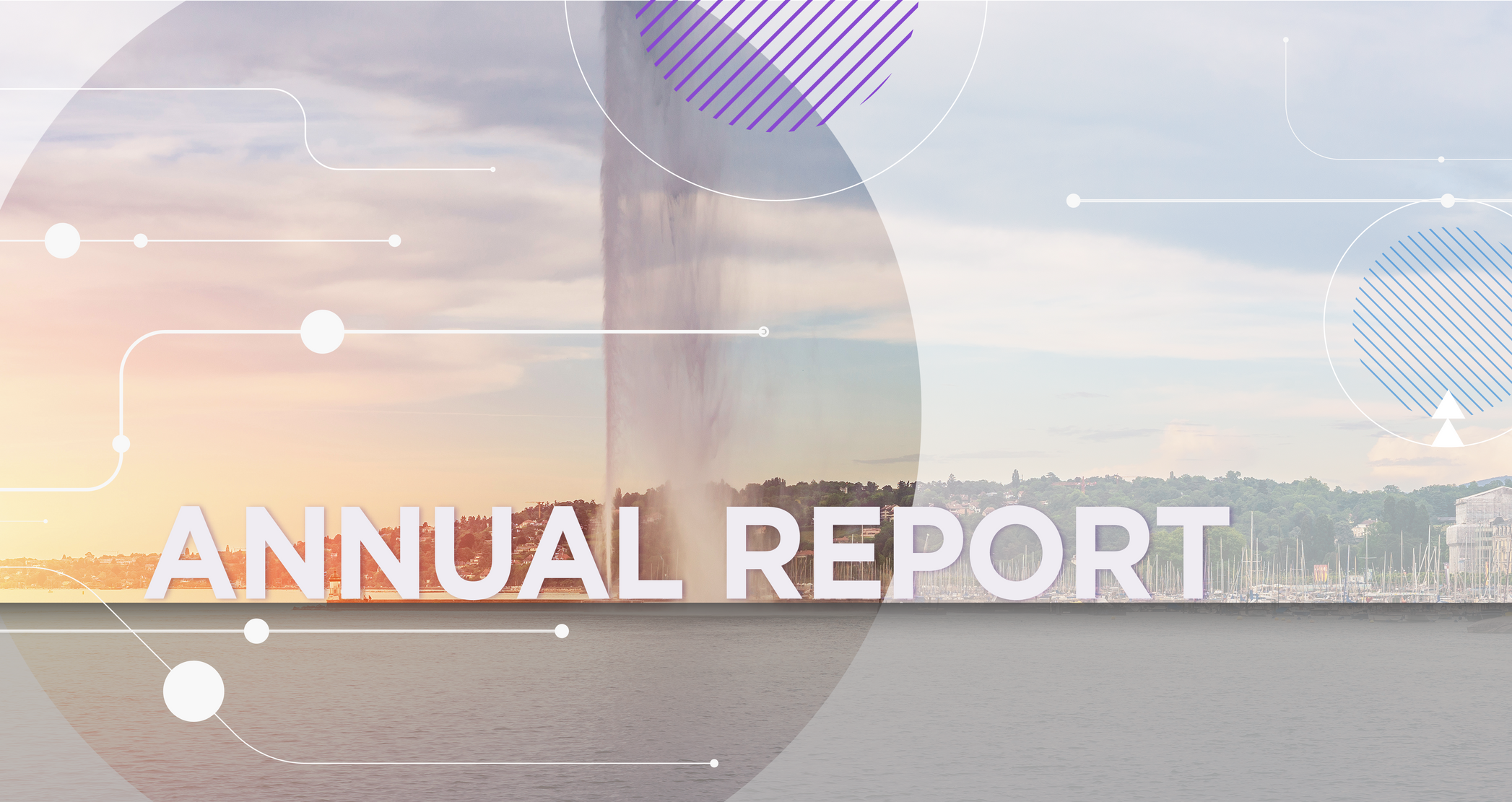
2022


Foreword from the President of the Board
As a non-native speaker of English, I have always been attracted to English words that do not find an adequate counterpart in my mother tongue. SERENDIPITY is one of those. A definition is an unsought, unintended or unexpected but fortunate discovery or learning that happens by accident. Or much simpler, when something good or beneficial happens by chance. Serendipity has played a prominent part in many scientific discoveries. We have also learned from Peter Drucker that unexpected events are the simplest and easiest source for innovation. But serendipity isn’t just luck as winning a lottery. For it to be fully seized, it requires a mindset that pays close attention to one’s surroundings, of keeping an open mind, being curious and that of making connections. It is exactly that mindset which we all share at the Geneva Innovation Movement. We come out of our silos and add a horizontal perspective to the vertical. We mix and mingle, not always with a structured agenda, but always ready to be surprised. We meet amazing and inspiring people, we make discoveries by exploring the richness and the diversity of the Geneva ecosystem. And how hungry were we for these events, activities and exchanges as real people after the pause imposed by the pandemic. 2022 has been described by some as turning point in history, especially in Europe. 2023 is not getting easier. However, let us stay curious and eternal optimists.
I would like to extend my gratitude to the first GIM Board which we are now following for the next two years. Very big shoes to fill indeed but with the support, energy and excellence of Katherine and Iris, the Managing Director and Head of Operations we will do our best and pledge to continue the growth of the association which is attracting promising support from private and public sector.
Thomas Neufing
Chief, Center of Learning and Multilingualism at UN Geneva & President of the Board

Message from the Managing Director
"If you want to build a ship, don't drum up people together to collect wood and don't assign them tasks and work, but rather teach them how to long for endless immensity of the sea", advised Antoine de Saint-Exupéry. While we have been longing for the sea since the incorporation of the GIM, 2022 was the year our vision for an innovative future started to scale.
Externally, the world of 2022 faced tremendous suffering and turmoil with several unpredictable events coming to Europe’s doorstep. These events showed the uncertainty of the geopolitical and environmental situation and the need for transparency and openness in our work together. We have seen the organizations that we work with rise to the challenge of assisting waves of refugees and providing support in disaster zones with unprecedented speed. At the same time, we see a desire in Geneva and
now globally for further collaboration, increased knowledge sharing and a longing to continue improving processes and services through innovation.
Internally, 2022 saw the GIM focus to narrow down our activities and create the greatest value for our members. We were honored to bring in a new board that represents the cross-sectoral and cross-functional nature of our association. And we were thrilled to find renewed interest from the private sector in working with us to achieve our vision to enable organizational innovation as a force for good.
As we enter the third year of the association, I am optimistic for the outlook of 2023 as the year we learn to sail – together.
Katherine Tatarinov

The Geneva Innovation Movement Association
The Geneva Innovation Movement (GIM) Association is a knowledge sharing platform enabling organizational innovation as a force for good. It is a registered nonprofit association based in Geneva, whose members are individual change makers from across all sectors globally.

Mission & Vision
The GIM’s vision is to create and share knowledge about innovation as a force for good in mission driven organizations, to up-skill leaders, and to collaborate between sectors to provide new perspectives on organizational transformation. It has an abundance of knowledge, both from research and its membership base, and excels in translating fundamental research into tangible insights.
History
The Geneva Innovation Movement Association (GIM) was created out of a need identified by academic research, for a cross-sector platform that connects International Organizations, NGOs, and the private sector around the topic of managing innovation as a force for good.
While mission-driven organizations are increasingly adopting innovation strategies and initiatives to renew themselves and remain relevant in today's changing environment, they often find it difficult to inspire new types of behavior and lack the structures to catalyze innovative ideas. In addition, there is a lack of communication between international organizations.
In November 2020, a group of 16 entrepreneurs, opinion leaders, academics, representatives of organizations in Geneva and senior leaders from the UN founded the GIM around the idea that all mission-driven organizations have managerial processes and structures that embrace or stifle organizational innovation. They believe that management practices can be learned to remedy and improve the situation. The GIM facilitates the platform and provides thought-leadership by pooling and curating the expertise of its members and collaborators.

Thank You
We would like to thank all our members, founding members and partners for their collaboration, consultation, initiatives, ideas, and insights. You’re the ones that make the Movement happen!
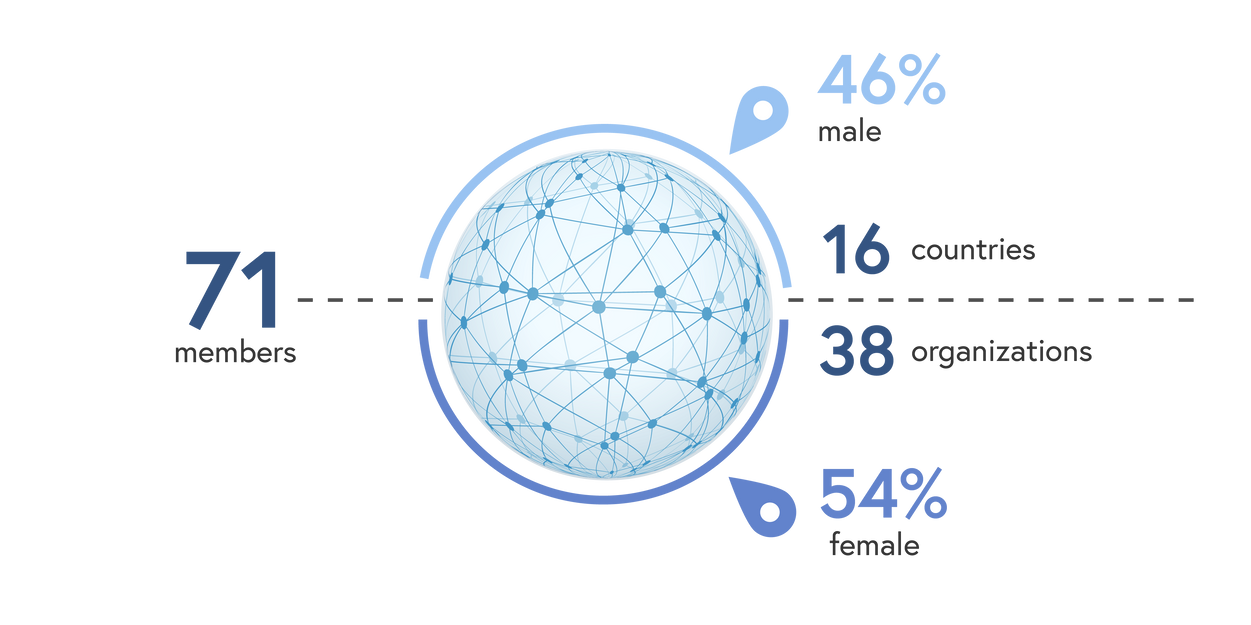

2022 in Brief
The first bi-annual Board Rotation took place in November 2022. We warmly thank
Corinne Momal Vanian, Sebastian Buckup and Pradeep Kakkattil for their two years of dedicated service as Board Members and putting the Geneva Innovation Movement on the map.
Meet the new Board

President
Thomas Neufing
Chief at the Center for Learning and Multilingualism at UN GENEVA

Treasurer
Nan Buzard
Head of Innovation at ICRC
Management

In 2022, the GIM channeled its focus towards knowledge sharing through up-skilling and customized programs. This enabled the association to facilitate intimate knowledge sharing get-togethers, accessible for members and invitees. This strategic refocusing was driven by a desire to better define the value of the network and knowledge sharing platform that is the Geneva Innovation Movement. In line with this strategy, the GIM redefined its three pillars of activities and reached several milestones in each pillar this year.
Below we highlight each of these activities
in more detail.
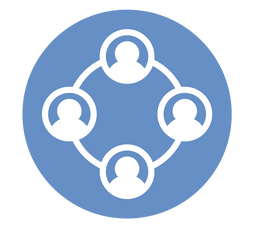
Pillar I: Network Building
Facilitating across silos and connecting people.
2022: We organized and participated in a total of seven events. Five events were freely accessible to the public, whereas two events were for our members only. We reached a total of 750 people with these events.
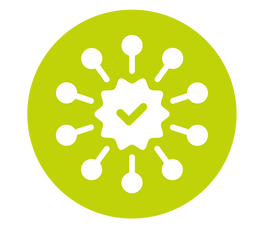
Pillar II: UPSKILLING
Developing new perspectives and new skills for managers.
2022: We facilitated three trainings and continue to develop the offering of customized programs.

Pillar III: KNOWLEDGE TRANSLATING CREATING AND COMMUNICATING INFORMATION.
2022: We shared four research papers and
three articles on the topics related to
organizational innovation. All publications
can be found on our Insights page.


Q1
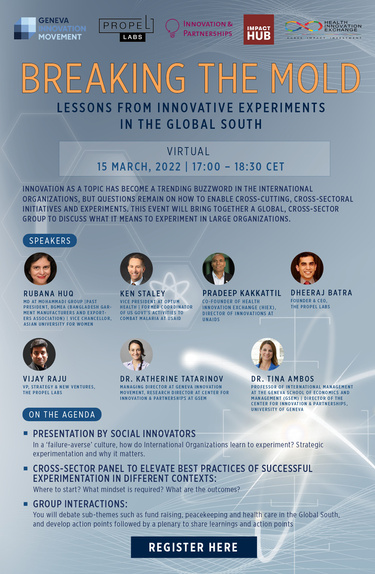
The speakers at this event were Rubana Huq – MD at Mohammadi Group and Vice Chancellor at Asian University for Women, Ken Staley – VP at Optum Health, Pradeep Kakkattil – Co-Founder of Health Innovation Exchange, Dheeraj Batra – Founder and CEO at The Propel Labs, Vijay Raju – VP Strategy and New Ventures at The Propel Labs, Dr. Katherine Tatarinov - Managing Director at the Geneva Innovation Movement Association and Research Director at Center for Innovation & Partnerships at UNIGE, and
Dr. Tina Ambos – Professor of International Management at UNIGE.
Key takeaways
Moving fast is key when adapting to changing situations. To know if that movements is in the right direction, one needs to follow the process of ideation, prototyping and testing for all potential solutions. Accepting that some ideas will fail is part of the innovation game!
PILLAR I: Network building
The GIM facilitates across silos and between organizations and connects people
Q2
The GIM and The Propel Labs jointly organized a virtual interactive panel titled Breaking the Mold: Lessons from Innovative Experiments in the Global South. We discussed what it means to experiment in large organizations illustrated by cross-sectoral real-life examples.
In cooperation with the United Nations Library, we hosted the panel discussion Agile in Action: Practical Ways to Create Agile Teams and Organizations, where we learned about agile methodology, what it means in the modern workplace, and what it entails in different sectors including the UN and the Private Sector.
The panel consisted of and Dr. Tina Ambos – Professor of International Management at UNIGE, Dr. Katherine Tatarinov - Managing Director at the Geneva Innovation Movement Association and Research Director at Center for Innovatoin & Partnerships at UNIGE, Dr. Susanna Nagel – Head of Quality Control at Roche, Daniela Wuerz – Senior Coordination Office and Change Manager at #NewWork, UN Geneva, and Malta Ionasova, HR Specialist at
UN Geneva. The panel was moderated by Thomas Neufing, Chief, Center
for Learning and Multilingualism at UN Geneva.
Key takeaways
Agile methods give staff members the empowerment and adaptability to work across different functions and regions. There is a key role for leadership to facilitate and support the creative environment that is required for innovation from the inside. Adopting agile methods is a transformative process for which all involved need to commit to a change in culture. As a spin-off from this event, the GIM, UN Geneva and Roche have co-created a customized program for teams in bureaucratic organization who wish to adopt agile methods.


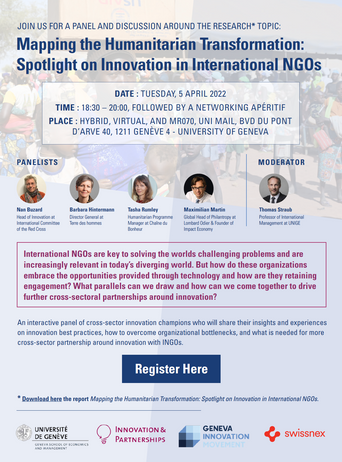
GIM and the Center for Innovation & Partnerships presented the research paper Mapping the Humanitarian Transformation: Spotlight on Innovation in International NGOs, written by
Lisa Canova, Dr. Thomas Straub, Dr. Katherine Tatarinov and Dr. Tina Ambos (all UNIGE). The panel, consisting of Nan Buzard – Head of Inno vation at ICRC, Barbara Hintermann – Director General at Terre des hommes, Tasha Rumley – Human-tarian Program Manager at Chaîne du Bonheur, and Dr. Maximilian Martin – Global Head of Philantrophy at Lombard Odier, addressed critical issues on how to foster both innovation within the organizations and stimulate cross-sector collaboration around innovation.
Key takeaways
Cross-sectoral collaboration is possible when the goals and values are aligned. If organizations share information and build personal relationship of trust, together they can do things that couldn’t be achieved alone.
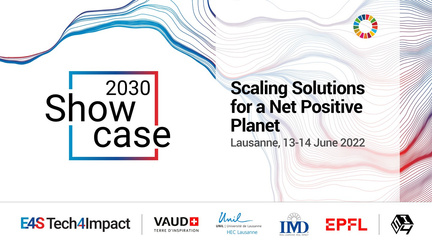
We hosted an interactive Masterclass on Innovation for Impact: How to Transform International Orga-nizations through Innovation during the Showcase 2030 at EPFL, organized by E4S Tech4Impact. The participants discussed innovative initiatives, scaling frontier technology and the real value of innovation units in bureaucratic organiza-tions. This Masterclass was presented by Dr. Katherine Tatarinov-Managing Director at the Geneva Innovation Movement Asso-ciation and Research Director at Center for Innovation & Partnerships at UNIGE.
Key takeaways
Key challenges of innovation is how to measure its impact for the organization, and how to scale it when it is deemed successful.

When the summer came to close, the GIM provided its members with the opportunity to meet each other and share their expe-riences during a networking event at the premises of UN Port in Geneva.

Q4

At the INSEAD’s Tech Talk X Webinar, GIM’s Managing Director Dr. Katherine Tatarinov and Dr. Tina Ambos participated in the academia-practitioner dialogue on the topic AI as a Force for Good in International Organiza-tions. This event was based on their paper with Prof. Phanish Puranam and Ruth McLachlin, titled “Creating People-Centric International Organizations with AI”
Key takeaways
While the power of AI to address the most pressing issues of our time is undeniable, it is imperative to keep in mind that a fundamental change in mindset, capabilities, and business processes is required.
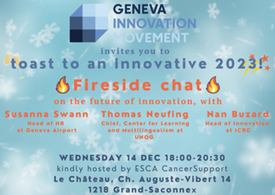
The end the year appropriately, GIM organized a Fireside Chat & networking event on the Future of Innovation, hosted by ESCA CancerSupport’s Director Elina Viitaniemi. The panel for this event was formed by the newly appointed Board Team, consisting of by Thomas Neufing, Chief, Center for Learning and Multilingualism at UN Geneva, Susanna Swann – Chief Human Resources Officer at Geneva Airport, and Nan Buzard, Head of Innovation at ICRC. Moderated by Katherine Milligan – Director at Collective Change Lab, the Team conversed with the audience on how innovation has transformed organizations in 2022, and on the institutional innovation agendas for 2023.
Key takeaways
While disruptive innovation usually takes center stage, incremental innovation is still key to driving forward transformation. While the use of technology for humanitarian needs is more and more recognized and actioned, cybersecurity and ethics become central to the discussion. The value of relationships and learning from other on this front is certainly recognized. We need to look ahead and use foresights to map scenarios and plan strategically in an uncertain world.

REFLECTIONS with Thomas Neufing
Chief at the Center for Learning and Multilingualism at UN GENEVA
When reflecting about the importance of psychological safety as a prerequisite for innovation in organizations, I asked myself: how can a leader promote psychological safety in concrete terms? Obviously, emotional intelligence and empathy are important competencies but how can leaders effectively create an atmosphere of trust and psychological safety in teams entrusted to them? I was truly inspired by witnessing a very accomplished, respected senior colleague when she recently disclosed her disability unknown to her staff in a large townhall meeting. She described her struggles but also how she learned to overcome them and how to succeed.
The powerful message to her staff (more than 600) was that everyone can contribute and excel in a safe context as none of us is perfect. It was about inclusion and respecting diversity. It resonated with so many as we are so often “on guard” because we think we might deviate from the norm (whatever that is). Her “coming out” almost instantly made her staff feel safer since she trusted them enough to share something very personal. Suddenly it was possible for everyone to show vulnerability without fearing rejection or reprisal. What I learned was that vulnerability and leadership do not contradict each other.


PILLAR II: UPSKILLING
The GIM develops new perspectives and new skills for managers
The GIM extended its program of customized training offerings in 2022, by adding the Human Centered Design training as a separate offering, and developing an Agile Methods Strategic briefing, in cooperation with UN Geneva and Roche. The Agile Methods briefing will be facilitated as a stand-alone product for the first time early in 2023.
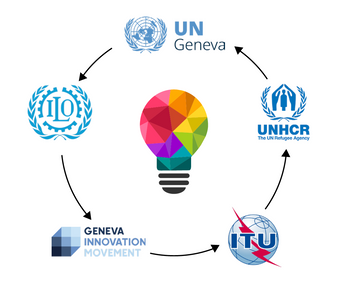
The Innovation Movement Training, the GIM’s flagship offering, was offered once in 2022 for an audience of 13 people from 9 different locations, representing 5 organizations (UN Geneva, UNHCR, ILO, ITU and World Economic Forum). Over the course of 8 hands-on 2-hour sessions in a virtual setting, the participants familiarize themselves with various innovation methodologies. The training engages leaders in innovation and provides processes and tools to assess the value-adding potential and the challenges of innovation-driven agencies and organizations. The training is co-created with the organizations and its content is constantly updated to reflect the latest knowledge and current trends in innovation.

The GIM facilitated two Human Centered Design for Humanitarian Work trainings. This training targets Teams in International Organizations, and was delivered to UNHCR’s Interagency Coordination and Partnership Team and it’s Innovation Service Team , reaching a total of 31 people. The Human Centered Design training is a spin-off from the module that is offered during the Innovation Movement Training. The stand-alone program focuses on Teams within an organization, and is customized to the Team’s needs. It is offered in an in-person, virtual, or hybrid setting.

The GIM organized a series of four Webinars exclusively
for WTO staff on the topic of Innovation & Creativity in International Organizations. The topics covered included “Innovation at WTO: How to Foster Innovation in Interna-tional Organizations”, “Organizing Innovation: Creating Structures and Incentives”, “Measuring Impact of Inno-vation Activities: Towards a Portfolio Approach”, and “Breaking through the Bureaucratic Process: What it Takes to Lead Change”. Guest speakers included Adriana De Oro – Innovation Coordinator at ITC, Stela Mocan – Technology & Innovation Lab Manager at World Bank, Tristan Walker – Communications Executive at International Monetary Fund, Benjamin Kumpf – Head of Innovation for Development Facility at OECD, Vic Van Vuuren – Director Enteprises at ILO, Nan Buzard – Head of Innovation at ICRC, and Pradeep Kakkattil – Co-Founder of Health Innovation Exchange.
Dr. Katherine Tatarinov and Dr. Tina Ambos facilitated the Webinars, which were attended by a total of 180 people.


PILLAR III: knowledge creation and dissemination
The GIM creates and communicates insights in innovation-related topics
In 2022, GIM members collaborated to and curated seven insights in the form of white papers, scientific research, and blog posts, which can all be found on the Insights page of the Geneva Innovation Movement website.

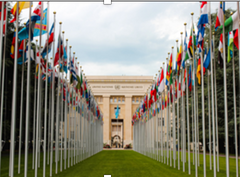
The Relational Work of Systems Change
Innovation for Impact: An International Business Perspective on Transforming the United Nations
Collective impact efforts must prioritize working together in more relational ways to find systemic solutions to social problems.
The UN organizations are major players in international governance and are characterized by bureaucratic, globally dispersed and politically driven structures, but are hardly ever considered in IB research. The UN organizations are strugg-ling to create innovative approaches to fulfill their core missions in today’s digital world and evide-nce shows that intrapreneurship and scaling innovation will be critical for transformation.
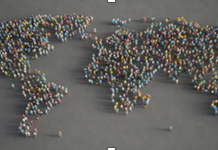
Creating People-Centric International Organizations with AI
The United Nations is both a fascinating playground for artificial intelligence applications and a showcase of AI implementation problems and solutions. This Knowledge Piece explains why. Based on on the research by the same authors "Ethically Embracing the New Frontier: Artificial Intelligence Initiatives in International Organizations (2021)" also curated on this page.

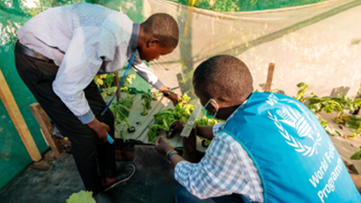
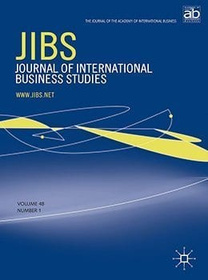
Die Kraft der Innovation
Scaling Digital Solutions for Wicked Problems: Ecosystem Versatility
The United Nations is often criticized for its lack of innovative spirit. However, there are many groundbreaking innovations emanating from the UN. Important drivers of this are entrepreneurship and digital technologies, which enable even large bureaucratic organizations to develop new capabilities and launch transformation processes.
Digital solutions are increasingly used to address “wicked problems” that are locally embedded but require global approaches. Scaling these solutions internationally is imperative for their success, but to date we know little about this process. The paper analyzes how four digital solutions driven by the United Nations are built and how they scale internationally.
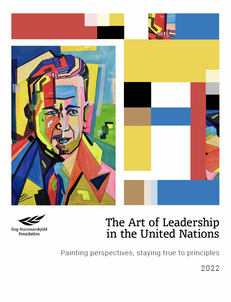
The Art of Leadership in the United Nations: Painting Perspectives, Staying True to Principles
UN leaders play a pivotal role in setting the internal organisational narrative. To innovate in large bureaucratic organisations, leaders need to frame key challenges while giving people the space and resources to solve those issues creatively.
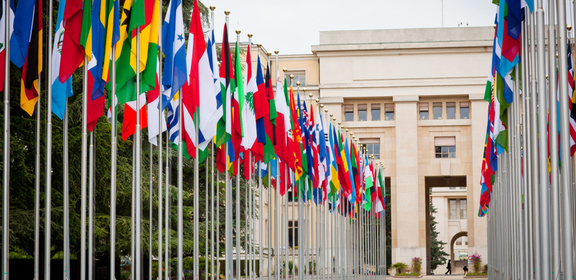
Managing, Structuring and Scaling Innovation in International Organizations
Summary of Dr. Katherine Tatarinov's award-winning dissertation on innovation for transforming the United Nations (UN) to solve the grand challenges in a technologically evolving world. Her findings show the cross-sectoral potential for delivering global impact through innovation. It also shows that IB scholars have the frameworks and tools to move beyond traditional contexts to address real problems in the global economy.

REFLECTIONS with Pradeep Kakkattil
Co-Founder of the Health Innovation Exchange
I am writing this on my way back from India, where I had the privilege of meeting some amazing innovators pushing the boundaries, finding new ways to solve problems – both the old ones that the world seems to have accepted and agreed to live with (unfortunately) and new ones that threaten human development and progress.
In my role leading the Health Innovation and Investment Exchange (HIEx), a platform that works with governments, innovators and investors to identify pain points in scaling access to healthcare by leveraging innovations, I have been blessed to meet some bright and committed innovators. One take-away this month is that human ingenuity, when leveraged, can find solutions to the most daunting problems we face.
Take primary health care for example: the challenge countries face is lack of financing and models for sustainable scale. Unless we address primary health, countries will struggle to keep up with the mounting expenditure making health budgets unsustainable. Can we build a model that is high quality, scalable and sustainable? Shiv Kumar at Swasti in Bangalore is a serial social entrepreneur in health. Their nurse led a model Ithat builds on a micro saving and lending platform, which currently is able to generate 70% of the total costs of the insurance. It is expected to be fully sustainable within one year. They work with poor and vulnerable women who save USD 0.60 per week in return for health insurance for the entire family. The model takes a commercial approach that empowers the women and their families: apart from offering health insurance,
it promises to make them Lakhpatis – people who have one INR 100’000 (roughly USD 1’250) in their account – something that they could not imagine possible!
And that is the second lesson – impactful innovations cut across sectors to deliver results for people. The development sector is riddled with silos and to get to the SDGs, innovation needs to break these. This is also why HIEx has partnered with Reckitt, the Kofi Annan Foundation, Eco Bank Foundation and Tokenproof in developing the WiNFUND. This Fund addresses two key challenges: one out of two people globally don’t have access to essential healthcare, and health entrepreneurs (particularly women) are critical for closing the inequities in healthcare access. However, female entrepreneurs receive less than 2% of global venture capital investments, despite returning 35% higher annual returns! The WiNFUND is partnering with the Web3 community to launch a series of NFTs to raise funds to invest in women-led health enterprises. The first of the NFT series will be focused on Africa and will be launched on the margins of the UN General Assembly in September.
The third lesson this month is that innovators need tenacity! I met a medtech innovator who spent 22 years staking all he had in pursuit of his dream. And even more striking – now that he is successful, he is giving back by investing in young startups to help them reach their goal faster. Perhaps the real lesson is that innovation is not in only the mind – perhaps it’s the condition of our hearts that counts.

Outlook
After 2 years of existence, the GIM will continue focusing on surfacing knowledge, energy, and inspiration from existing members. Ideas will be shared in smaller, thoughtfully curated group discussions. The association will work with partners to shape an 'innovation observer' report in a way that aligns with GIM's values. And the GIM will continue to up-skill managers in ways aimed at breaking down silos and demystifying transformation tools.
In 2023, the focus will be on network building events, knowledge sharing circles, and the sharing of actionable insights.
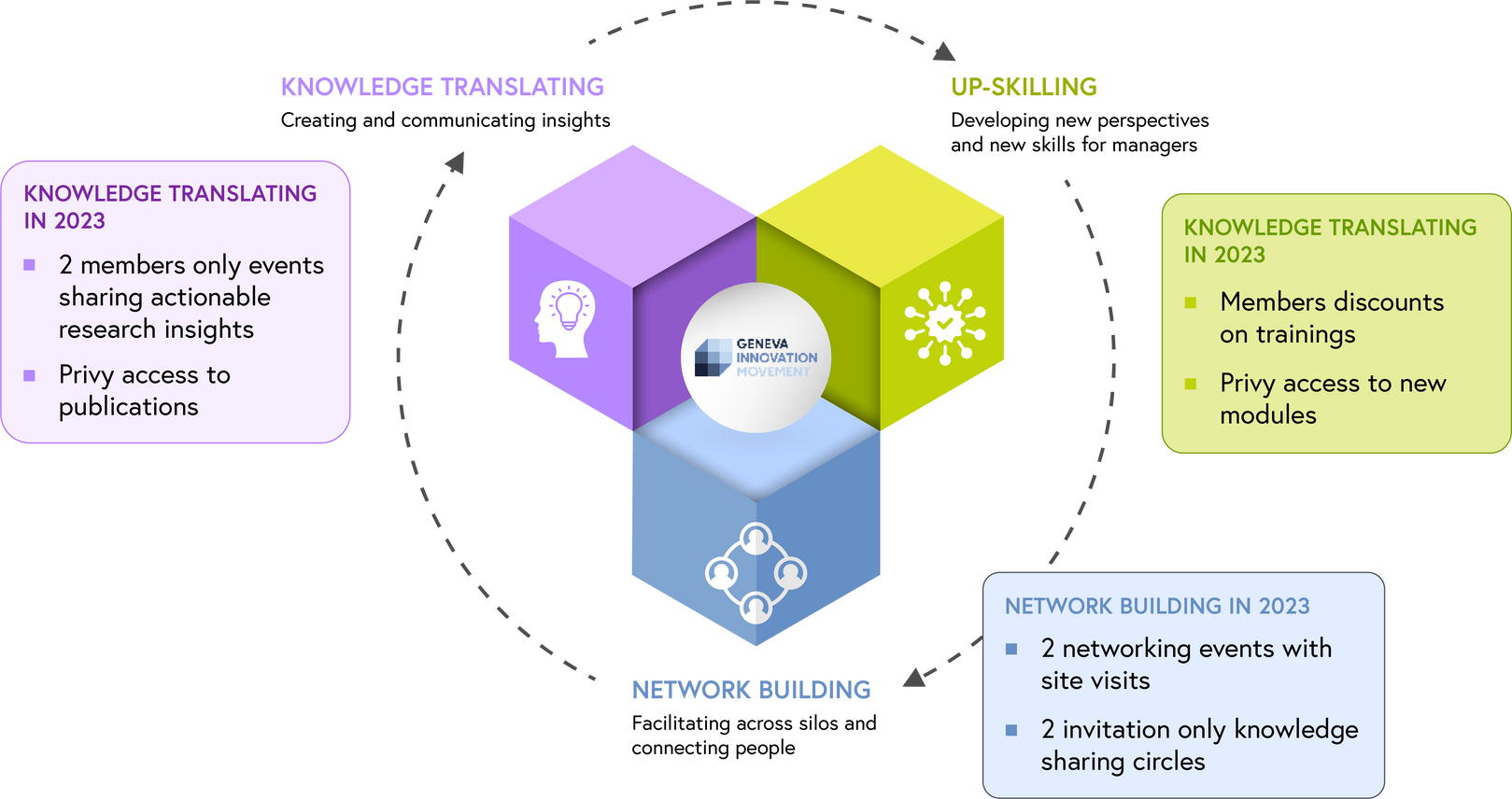
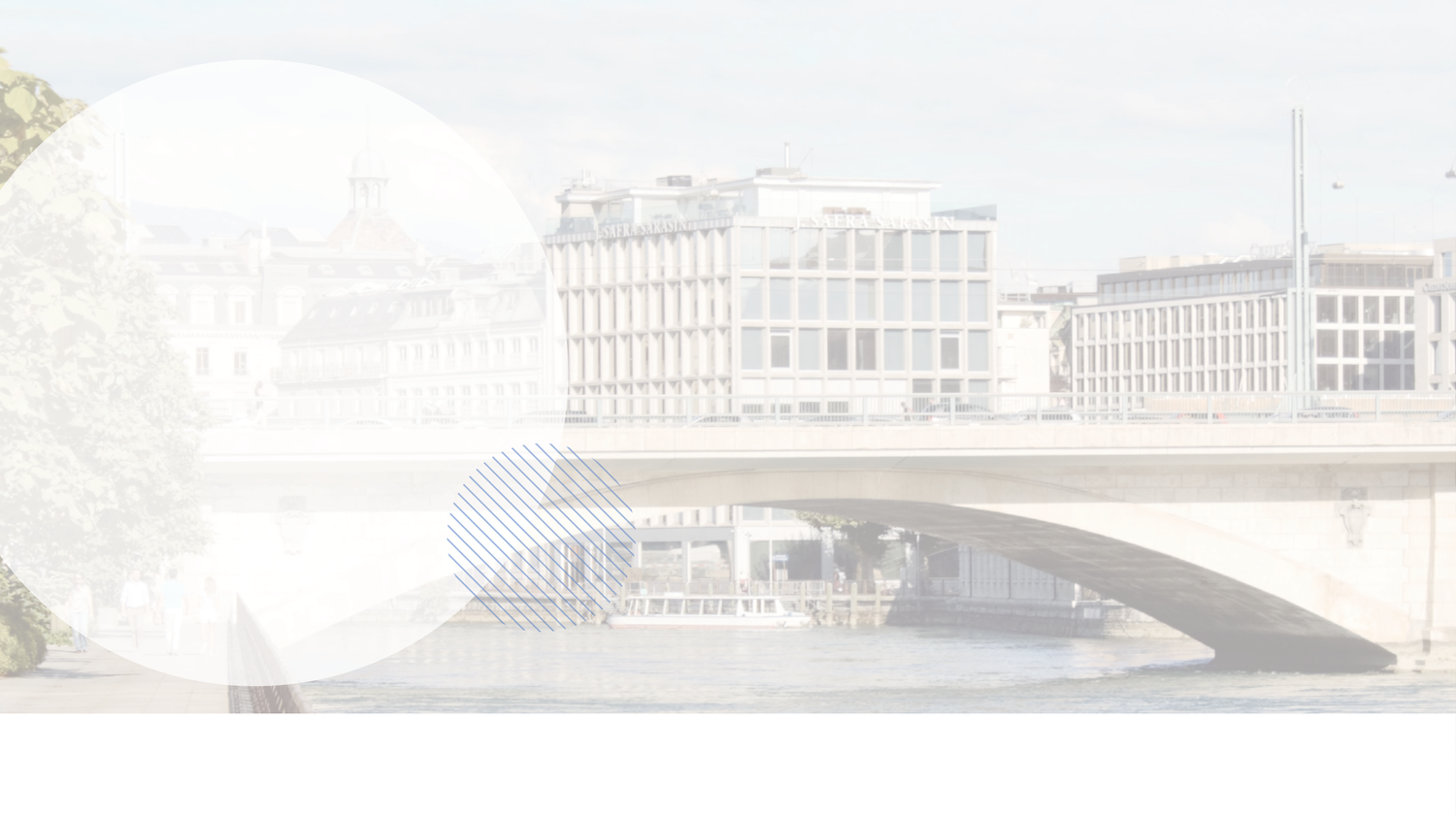
2022
ANNUAL REPORT
The Geneva Innovation Movement Association
Annual Report 2022
Editor:
Iris Dieleman
Visual and design:
Stacie Baek
© The Geneva Innovation Movement Association
Published by The Geneva Innovation Movement Association




